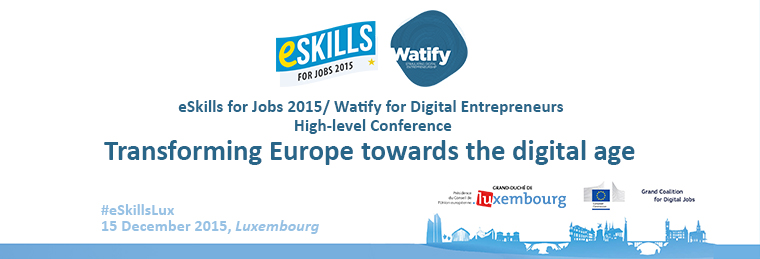eSkills for Jobs 2015 - Watify High-level Conference : Transforming Europe towards the digital age
Date and time
Location
Alvisse Parc Hotel
120 Route d'Echternach 1453 Luxembourg LuxembourgDescription

Background
The greatest gains to be made from the creation of a Digital Single Market lie not in the tech sector itself but in the adoption of advanced digital technologies by the rest of the economy. That’s where an estimated three quarters of the bottom line benefits to countries' gross domestic product can be made. Applying the latest digital tools in industries such as agriculture, transport, retail and health will boost productivity and efficiency, and make companies and public sector organisations more competitive and entrepreneurial. This will spark a new dynamism in Europe’s industrial base, which will help create new jobs, many of which don’t even exist today.
Companies and public services need to invest in advanced digital technologies, such as mobile communications, social media, cloud, big data analytics, smart devices, connected objects and sensors. Organisations all over the world are already starting to use these technologies to scale up at impressive rates. It’s not a question of stealing a competitive advantage anymore; it’s more a question of avoiding being left behind.
The way European industry and its enterprises engage with this digital transformation will play an important role in determining Europe’s position in the global market.
Digital technologies are transforming our world. But existing barriers online mean citizens miss out on goods and services, and start-ups have their horizons limited, and businesses and governments cannot fully benefit from digital tools. The Digital Single Market makes the EU's single market fit for the digital age – tearing down regulatory walls and moving from 28 national markets to a single one. The European Commission note that this could contribute €415 billion per year to our economy and create hundreds of thousands of new jobs.
But European industry in not transforming fast enough and part of the reason is the lack of a trained and highly skilled workforce here. There are thousands of unfilled digital jobs available today throughout all industry sectors. At the same time Europe still suffers from high levels of unemployment, especially among young people. This apparent contradiction has been dubbed the skills gap. Digital skills are also required for nearly all jobs, as technology increasingly complements existing tasks. That is the reason why the European Commission is trying to help member states address it by calling for greater uptake of eSkills and digital transformation.
However, it’s not just a question of a skilled workforce, it’s also a question of leadership. Leaders and entrepreneurs spearheading the digital transformation need confidence and know-how. Europe must focus on enhancing its e-leadership pool.
Education and training systems are adopting digital technology to make both teaching and learning more effective and relevant. Future learning spaces will be smart and connected environments. But technology on its own is not sufficient to guarantee better education – teachers are the prime actors of change in the modernisation process. They need to be equipped with the appropriate digital skills for them to be prime actors of change in the modernisation process.
Find more on the event, confirmed speakers and hotels on our website: http://eskills4jobs.lu/
Organised by
DIGITALEUROPE is the leading trade association representing digitally transforming industries in Europe. Our membership represents over 35,000 businesses who operate and invest in Europe. It includes 98 corporations which are global leaders in their field of activity, as well as 41 national trade associations from across Europe.